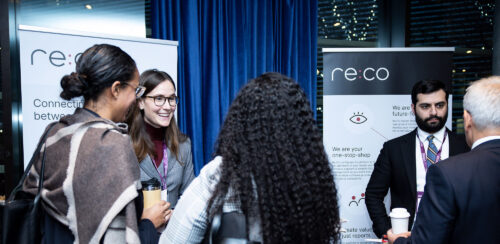Re:CO CEO Jennifer Wilson and COO Eric Bloom speak to private equity professionals at the Responsible Investment Forum in London in November 2022.

From RMI Interns to Pioneers in Financial Sector Sustainability
They met as interns at RMI in 2008. Today, they’re running a startup that advises private market investors on how to take action on ESG.
Jennifer Wilson (second from left, above) will never forget seeing an article in The Economist written by Amory Lovins about why investing in energy efficiency is good business. “He seemed like an amazing person that connected environmental and energy goals with market-based principles,” she explains. “I was working on a degree in business and a second degree in the environment because I wanted to combine the two, and I thought there are so few organizations that are combining these two lenses, and that brought me to RMI.”
Meanwhile, Eric Bloom (second from right, above) was studying architecture at Yale and when he graduated he decided that he didn’t want to design green buildings one at a time. “I wanted to work on the big picture, and RMI was one of the few places that I felt really targeted those scalable solutions and really moved the needle on sustainability more broadly.”
So Wilson and Bloom both ended up at RMI as interns in 2008, and it turned out to be an auspicious meeting. Although Wilson worked on mobility and vehicle efficiency, focusing on RMI’s Project Get Ready, and Bloom worked with Greg Franta on energy efficiency in the built environment, the two became good friends. And now, 15 years later, they are running a company that helps private market investors and their portfolio companies take meaningful environmental, social, and governance (ESG) action. They both credit RMI with shaping their thinking and helping their company succeed.
From RMI to ESG
After the internship, Bloom stayed in Boulder and joined start-up Pike Research working on energy efficiency retrofits and smart building technologies. After about three years in the Boulder office, the company sent Bloom to work out of its London location. Wilson happened to be in London at that time too, as at the end of her internship she had the opportunity to go to Oxford for her master’s degree focusing on energy and corporate responsibility.
Their friendship continued on the other side of the pond. “I felt so lucky to be at RMI and in beautiful Boulder with all these incredibly smart, fun, and mission-oriented people,” Wilson says. “But I couldn’t pass up the opportunity to study in Oxford.” After obtaining her master’s degree, she became a consultant with Bain & Company, after which she took a job as the chief financial officer of a group of engineering companies.
But Wilson wanted to take the work she was doing as a financial executive and make a larger impact: “RMI definitely helped shape my thinking.”
“During my time as CFO, bringing sustainability into the core value creation strategy not only improved our performance for people and the planet,” she says, “but it also helped to improve our financial performance. It was really a market-based approach to focusing on sustainability and seeing some of the business benefits, and I wanted to do that at scale.”
So in 2021, Wilson founded Re:Co to help companies make smarter ESG decisions, currently serving as chief executive. She swiftly brought Bloom on board, who she says, “has taken the company to a whole new level,” as chief operating officer and head of client solutions.
According to Bloom, RMI’s whole-systems approach provided a solid foundation for how to help companies navigate the energy transition and has greatly influenced how they serve Re:Co’s clients. “The principles of natural capitalism held up when Amory first penned them, and I think they still hold up today,” Bloom said. “Today, people want to jump to the easy solutions when it comes to climate, and, say, for example, ‘let’s just buy a bunch of offsets,’ ‘let’s go install solar everywhere.’ But RMI gave both of us this foundation where we said we want to look at the bigger energy system picture holistically, and we want to think about what leads to the most cost-effective, most logical way to go about transforming it.
Re:Co uses the RMI framework to look at their clients’ carbon footprint, their energy usage, and where they are as an organization, to figure out the most cost-effective way to get to their goals. “There aren’t a lot of voices in the ESG and private equity world that think that way,” Bloom adds. “And we’re coming at that angle from the foundation that we got at RMI.”
For Bloom, it’s not enough for a company to make its headquarters green. They also need to be thinking about the whole organization’s operations as well as its upstream procurement and downstream impacts. “We’re always looking at where the levers are to pull for sustainability, for equity, and for a just transition, which are inextricably intertwined. And the great thing about ESG is that it encourages companies to think comprehensively and make decisions based on the entire system.
ESG Is Having a Moment
ESG has been in the news a lot lately, and some of the issues have been controversial. Wilson sees some of that controversy as positive because it means it’s being talked about more than ever before. “There’s more division, but that’s because it’s highly relevant, and it’s a boardroom conversation where it wasn’t previously,” she says.
As Wilson puts it, there is greenwashing on one side and questions around fiduciary duty on the other side. Which is why Re:Co encourages its clients to focus on actions and performance over talking the talk or trying to project a particular image. “Taking the right action is more valuable to companies in the long term and reduces the risk of there being a disconnect between intention and performance,” Wilson says.
Re:Co also takes a motivation-agnostic approach to addressing sustainability. “We don’t really care where you’re coming from or why you’re taking the action you are,” Wilson says. “If we’re all trying to reduce energy usage and carbon emissions, we need to roll up our sleeves and do this together.” This philosophy allows them to drive meaningful action with all sorts of management teams and types of businesses, and Wilson and Bloom credit RMI with shaping their ability to convey the benefits of sustainability to diverse audiences regardless of motivation.
Building an Amazing Team
Today, Re:Co has more than 10 team members and is growing quickly. Bloom says that the RMI internship helped inspire their ideas for how to build their team at Re:Co. “We often talk about what an amazing team we worked with at RMI, where everybody was smart and mission-oriented, and now that we’re overseeing a fast-growing team, we realize we can create the exact culture and attract the kind of people we want to work with,” he says.
The internship at RMI helped Wilson and Bloom create lifelong friendships with others in their intern cohort. Fifteen years on, there is still an annual ski trip many of them do together. And Bloom and another intern were members of the wedding party of Mark Dyson, another intern of the same cohort who now serves as a managing director overseeing RMI’s work on carbon-free electricity.

RMI Managing Director Mark Dyson (left) and Eric Bloom at Dyson’s wedding in 2013
And Wilson explains that RMI not only had an incredible impact on her, but also continues to have an incredible influence around the world. “RMI’s impact goes much further than the existing organization. There are so many people who have been inspired by RMI and go on to do amazing things,” she explains. “If you look at systems-level thinking on this, the impact is incredibly vast. I feel so grateful that I had the opportunity to start my career at RMI.”
Header Image: Re:CO CEO Jennifer Wilson and COO Eric Bloom speak to private equity professionals at the Responsible Investment Forum in London in November 2022.